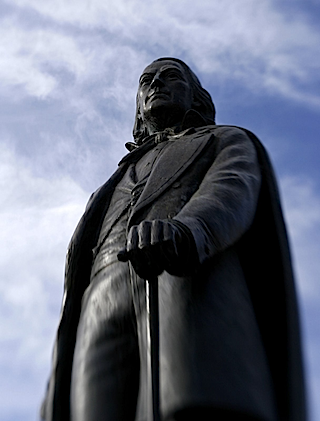 In early October 2008, recent BYU graduate Chad Hardy received a letter dated September 30 from Norm B. Finlinson, Executive Director of Student Academic and Advisement Services, informing him that he had been deleted from the August 2008 Graduation list and would not be awarded a degree from Brigham Young University.
In early October 2008, recent BYU graduate Chad Hardy received a letter dated September 30 from Norm B. Finlinson, Executive Director of Student Academic and Advisement Services, informing him that he had been deleted from the August 2008 Graduation list and would not be awarded a degree from Brigham Young University.
On August 15, 2008 Hardy graduated with a BA in Communications Studies from Brigham Young University and walked with his class.
Just a month prior on July 13, a week after he completed his independent study courses to fulfill his graduation requirements, Hardy was excommunicated from the Church of Jesus Christ of Latter-day Saints for publishing of the now famous "Men on a Mission Calendar" - a tongue-and-cheek charity project intended to strip-off stereotypes associated with the Mormon culture.
Because the Church of Jesus Christ of Latter-day Saints is the affiliated sponsor of BYU, the accredited university is holding Hardy's degree, according to the letter, until he is reinstated as a member of the Church in good standing. BYU claims that Hardy was not in good honor code standing at the time of the posting of the degree because he was no longer a member of the LDS church, and therefore is justified in good Christian conscience to not award Hardy his degree.
Brigham Young University is an accredited school. However, they are allowed to set its own standards for student expression, assembly, and "due process" rights. At publicly funded schools, student rights are governed by the standards of the U.S. Constitution. At private, religious institutions like BYU, a student "code of conduct" defines permissible speech and due process standards. This means BYU can revoke a degree based on a student having been excommunicated, whereas if a publicly-funded university, the same act would be considered discrimination based on religious affiliation. All BYU has to do is follow its own procedures, as stated in the Honor Code.
BYU insists on strict compliance with the Honor Code. Yet it appears the Church does not feel itself bound by any concept of due process, let alone strict compliance with the Honor Code, since it is withholding Mr. Hardy's degree without following its own policies and procedures, including those specified in the Honor Code. BYU has not followed the Honor Code itself in terms of providing notice, opportunity to be heard, etc. This a double standard/hypocrisy.
The Church of Jesus Christ of Latter-day Saints proudly teaches that the Constitution of the United States of America was divinely inspired by God. Yet the Church has taken every legal measure possible to ensure that the Constitution does not apply to the students and faculty at BYU. If the Constitution is such a "glorious standard" as stated by Mormon leader President Ezra Taft Benson, then why isn't BYU's Honor Code and their church courts patterned after this God-inspired standard?
Please take a stand with Chad Hardy to remind the leaders of the Church of Jesus Christ of Latter-day Saints to behave like the Christians they profess to be. Together, we can make a difference!
MEET THE LEGAL TEAM
Stephen Clark's legal career has ranged from Main Street to Wall Street and beyond. His fields of expertise include complex commercial and corporate litigation, constitutional law, civil rights and family law. He has handled both trials and appeals in both federal and state courts. He was listed in Utah Business Magazine’s 2008 Legal Elite for business litigation. His current practice centers on helping clients with divorce and other family matters.
Stephen was born in Ogden, Utah on May 20, 1959. He graduated from Brigham Young University in 1982, and received his J.D. from the University of Utah in 1985. Before joining a law firm in New York City, he clerked for Judge Bruce S. Jenkins in the United States District Court for the District of Utah. He was European Counsel for ALCOA, based in Milan, Italy, from 1996 to 1998. As Legal Director of the ACLU of Utah from 1998 to 2002, he successfully litigated several high-profile constitutional and civil rights cases. He is an adjunct professor at the S.J. Quinney College of Law at the University of Utah, where he has taught courses in First Amendment and Judicial Process. He recently served on the Utah Judicial Council's Committee on Privacy and Public Access to Court Records. He also works as a volunteer mentor for the Third District Juvenile Court. He is admitted to practice in Utah and New York.
George M. Frandsen
George Frandsen has been a proponent in civil and human rights throughout his legal career. He was a
member of the National Board of Directors of the American Civil Liberties Union
and Foundation based in New York City and has been President of the Board of
Directors of the ACLU of Utah. After moving to California in 1998, George began working to reactivate the ACLU
Palm Springs Chapter. He was
chapter president from 2001 to 2003 during which time membership grew from 90
to nearly 700. While living in Palm Springs he served on the Board of the ACLU of Southern California.


